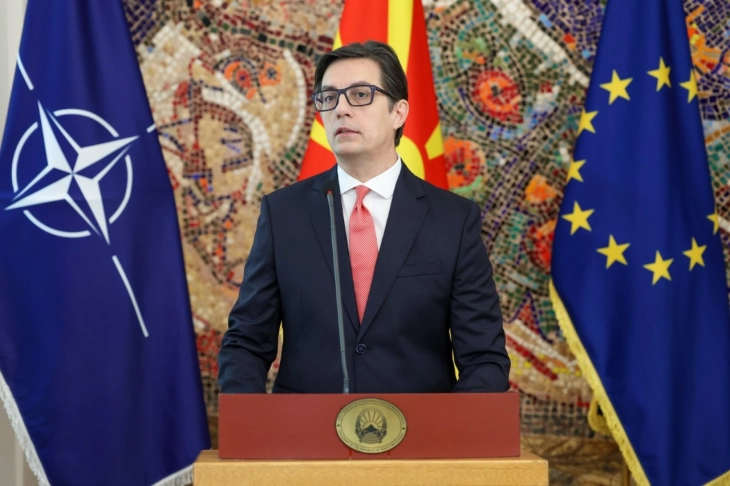Pendarovski presents Development Framework MKD 2030: Let’s leave country in far better share to future generations
- Post By Ivan Kolekevski
- 10:43, 9 June, 2022

Skopje, 9 June 2022 (MIA) – Accelerated economic growth, environment protection at the European average and redefined energy policy, speeding up digital transformation and promoting digital economy and education, youth and inclusive development are the four pillars of the Development Framework MKD 2030 that President Stevo Pendarovski promoted on Thursday.
“In order to have a real chance for a better future, it is of crucial importance to have the key factors in the state and social infrastructure behind one vision for long-term development. This is why I initiated the process of drafting the Development Framework MKD 2030, which although drafted in the second half of 2019 is being promoted today because of the COVID-19 pandemic,” said President Pendarovski.
According to him, the diagnosis of problems that North Macedonia has faced over the years is concerning, considering the modest economic growth, low competitiveness level and insufficient involvement in international supply chains.
“Corruption, clientelism and informal economy have accompanied us since gaining independence. Current development is environmentally unsustainable, socially non-inclusive, regionally unbalanced, energy vulnerable. The stalled European integration leads to frequent political crises, polarization in society and partisan institutions. Modest state investments in research and development have reduced productivity,” said Pendarovski.
All of this, he added, has a direct influence on the GDP growth, wages and living standard of citizens, especially the youth.
“Of the numerous negative data, I will share the one that 21.8 percent of the population lived under the poverty threshold in 2020, double of the EU average. Due to the combined effects of the health, energy and economic crisis, the number is now higher. Young people are emigrating in masses, citizens are becoming passive and apolitical, while distrust in institutions has been chronic. Our society is deeply divided and there is a widespread perception that it is impossible to make progress on the grounds of one’s own qualities and capabilities,” noted Pendarovski.
Therefore, the President said, we asked the question how to stimulate a comprehensive economic and social development of the country by the end of the decade, increase trust in institutions, reduce emigration of youth and bring back hope in people.
“MKD 2030 is not an office document but a field one. Experts did not compose it while isolated in their offices but through broad consultations within an inclusive and transparent process. Some of our leading minds put their expertise and experience at disposal. Over 60 organizations and individuals from civil society organizations, business chambers, academia, media and youth organizations were involved in various stages of development of this strategic document,” said Pendarovski.
MKD 2030 has considered the most negative and pessimistic scenarios and that is why the President expects it so stand the test of time.
“The four pillars include 166 specific recommendations grouped in 24 areas. The first pillar is accelerated economic growth, including rising productivity, increasing the economy’s competitiveness, mass investments in innovations and tech development, new domestic and foreign investments, shrinking informal economy and creation of a flexible and dynamic labor market,” said Pendarovski.
The second priority is environment protection at the European average and a redefined energy policy, with quality of life and health directly depending on this.
“We are talking about quality air, development of an effective system of waste management and integrated water management, protection of environment and biodiversity. The redefined energy policy will have to be focused in the long-term on meeting domestic needs, first and foremost, from renewable energy sources, while being resilient to energy shocks coming from the outside,” stressed Pendarovski.
The third priority is digitization, namely digital transformation and promotion of digital economy and education, full digitization of public services, raising the level of digital literacy and increased promotion of the Macedonian IT sector.
“The fourth pillar is education, youth and inclusive development, three inter-related fields. We can go out of the downward spiral of poverty, social exclusion and mass emigration through education adapted to the needs of the labor market. It is a priority to work on reducing poverty levels and social inclusion, develop contemporary culture policies, promote the respect of human rights, and invest in media literacy that is required to make a distinction between truth and lies,” said Pendarovski.
These four priorities, he noted, are inter-dependant and equally important for the development of North Macedonia, and therefore should be implemented in parallel.
The President expects MKD 2030 to be incorporated in the detailed National Development Strategy 2022-2042 of the Government, thus guaranteeing the continuity of sectoral policies, irrespective of future changes in power.
“This roadmap will help current and future policymakers to stay on the predefined path and avoid getting stuck into authoritarian and populist waters, which will, for sure, compromise the country’s long-term development but also its stability. As a pan-partisan platform, MKD 2030 can serve as a basis for overcoming deep divisions through a symbolic renewal of the social agreement. Development priorities will have to be observed by all future authorities and be valid for all. In this way, MKD 2030 can serve as a productive part of the process of civil reconciliation,” said Pendarovski.
He added that MKD 2030 can contribute to making North Macedonia a better place to live.
“I am saying this without false morals and pathetic – this is a historic responsibility that we all, especially public office holders, have for our children and grandchildren, but also future generations – we must leave the country in a far better shape than it is now,” concluded President Pendarovski.







